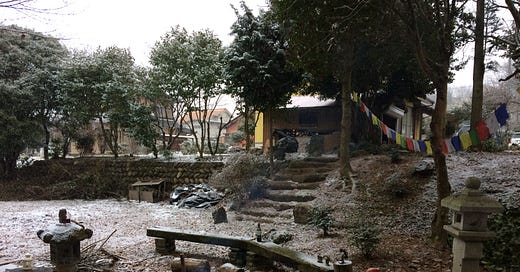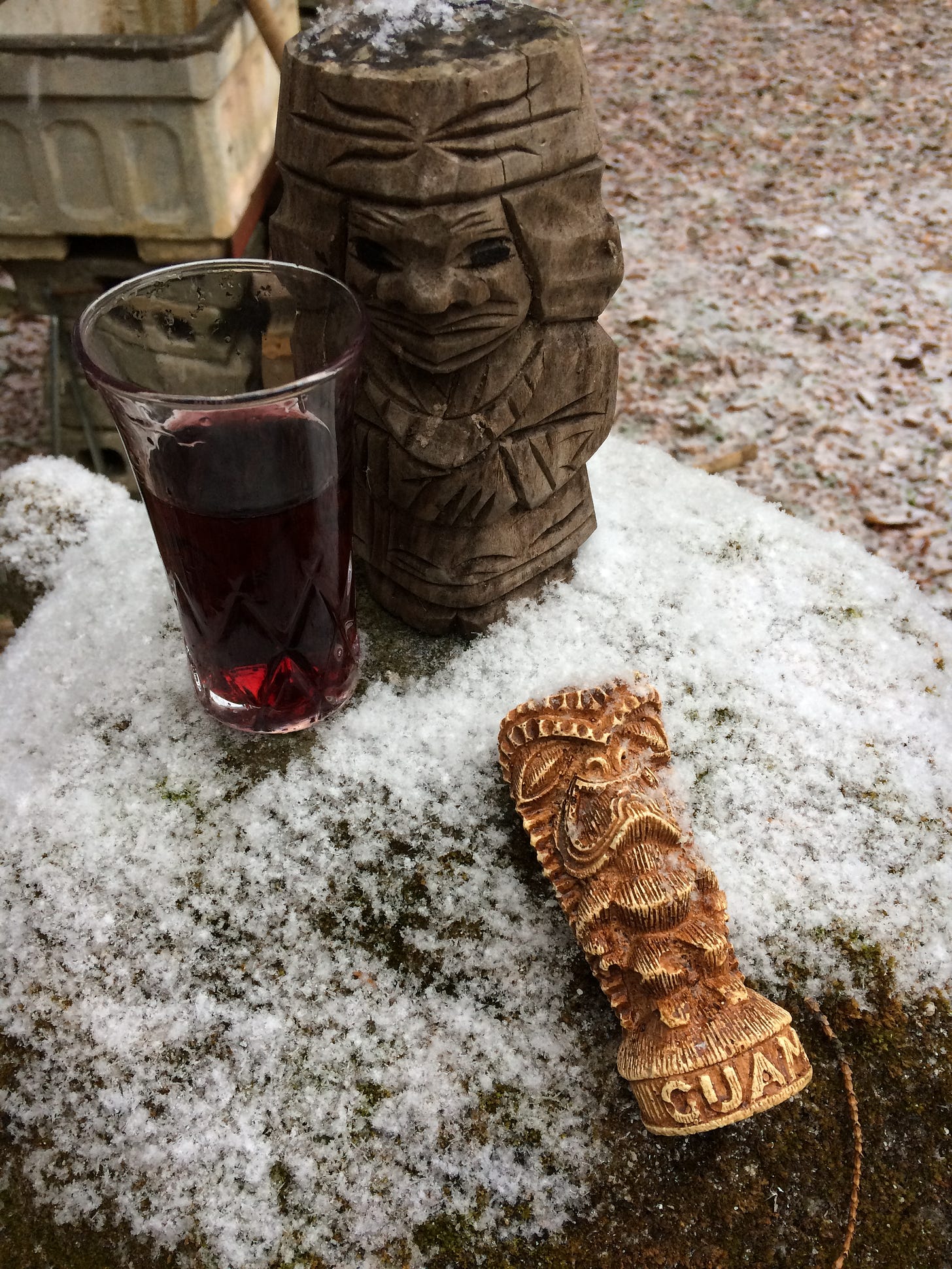When I first moved to Japan Christmas was the hardest time of the year. My family have never been the close, clingy kind – we are geographically spread out and early on in my life independence and a love of travel were held up as aspirational traits – but Christmas was special. After my parents divorced it became even more so – two Christmases! Twice the turkey! Two whole days where alcohol at breakfast is not only acceptable but positively encouraged! Double the effort from Santa!
Christmas in Japan is a weird thing. When I first came here, it pretty much didn’t exist. A few of the shops acknowledged it by advertising half-hearted sales (HEARTS 50% OFF!) vaguely linked to the titular mythical birth of the Christ and there were illuminations around train stations and the odd hotel. (Come stay at the Odd Hotel! Elevators stop on every second floor and rooms are uneven.) Due to the power of marketing, over the last decade it has morphed into something of a romantic event. For Japanese families, New Year is the big thing and Christmas has become a time when the young of Japan go on dates, exchange presents with their significant others or, in the case of many of my students, spend the fortnight before feeling increasingly miserable and alone, and desperate to hook up with someone. It’s like Valentine’s Day times a billion. Yay, capitalism.
My first year in Japan, 2005, I worked Christmas Day and it was the only time I remember being actively homesick. The students didn’t help, wanting to know all the details about a traditional Christmas. It was exasperating repeatedly telling them that we don’t eat cake or go to KFC on Christmas Day. I explained how most people have turkey but not everyone. One of my friends has a family tradition where they try to never repeat an animal for Christmas lunch. Duck one year, goose the next, wild boar and so on. Thinking about all that roasting meat made me miss home even more.
Yes, KFC. This is a thing. On Christmas Day in Japan, people stand in long lines to collect pre-ordered chicken buckets. The Colonel is dressed up like a cross between Bad Santa and a child’s fever-dream of a paedophile – seriously, passing a KFC late at night in December can be a terrifying experience. This is all done on the assumption that KFC is a Christmas tradition overseas. No amount of laughter or denial from us gaijin can convince otherwise. It all started in 1970 in Osaka with Takeshi Okawara, who managed Japan’s first KFC and filled a gap in the market with lies and crap chicken.
This is not my favourite Osaka-based Christmas thing though. In 2012 an Osaka department store won the prize for ‘best misuse of English ever’ by advertising a ‘FUCKING SALE!’ Using English in marketing has long been fashionable, but an unwillingness to hire native English speakers as proofreaders or a stubborn trust in Google Translate means these kinds of mistakes keep cropping up. Tokyo famously ran a Shine Tokyo! campaign, completely failing to spot that while ‘shine’ in English was innocuous, it could be read as shi-ne in Japanese. Shi-ne just happens to be the worst swear word in Japanese, one which literally means ‘go and die’. It was the real-life equivalent of Will Ferrell’s anchorman telling San Diego to go fuck itself.
To avoid KFC-related nonsense, the following year I flew back to Scotland just before Christmas. I had really bad jet lag all through the festivities and got stuck in Amsterdam’s Schiphol Airport for ten hours on the return leg thanks to a blizzard. After that I decided to grow up. Really, Christmas is for children. I am not a child and we are child-free, so Christmas is little more than a chance to torture myself with nostalgia. And as an atheist, the supposed ‘meaning’ of Christmas is just ancient cultural appropriation.
Japan, having been forever free of Victorians and Christians, rightly views Christmas as a shopping extravaganza, a quaint festival not to be taken seriously by any but the retail sector. New Year, however, that’s the thing. Companies close from around 29 December to 4 January and everyone heads home. If Chris Rea were Japanese he’d have delayed his song by a week.
For us, that means visiting Minori’s extended family. Our first New Year party in the countryside was bigger than usual. Minori usually volunteers to work New Year’s Eve shifts but that year she was off. My brother-in-law is an architect and had been sent to Mozambique for a couple of years, but had juggled things so that he could be back in time for the party. For once the entire clan would be there.
The party was held at Uncle Hideki’s house (he of the whale bacon), an all-day affair. Lunch and dinner, separated by a sobering walk.
The in-laws like a drink. It was one of the things that helped when their daughter brought a foreigner home. People who like a drink tend to enjoy a healthy love of Schadenfreude and we all know Schadenfreude makes the world go round. My fumbled attempts at polite Japanese and frequent foot-in-mouth moments caused friendly laughter rather than disapproval. We bonded over drink and mirth.
My father-in-law in particular is a fan of malted barley and hops. I remember on the day of his daughter Chiharu’s wedding, Yoji had been told by Miyoko that he wasn’t allowed to start drinking until I arrived. We pulled into the driveway just before 8 a.m. to find him standing on the tarmac, a can of Asahi in each hand, beckoning me onto the rocks like Calypso.
This year I took a case of Brewdog’s Punk IPA – product of my homeland, not far from where I came into the world, and now available in Japan – and a bottle of Highland Park as ambassadorial gifts. While the nibblings ran amok with toy trains and envelopes of cash (otoshidama – given to all children on New Year’s Day and an expensive tradition for the child-free) we adults sat on the tatami around low tables partaking of sushi, sashimi, various fried meats and Uncle’s impressively large saké collection. In his retirement he has decided to become an expert in the field, mainly, I suspect, because ‘connoisseur’ sounds so much better than ‘drinker’. He likes playing the host, and the food and drink flowed freely.
Minori’s cousin is also an architect, working for a Japanese company with global reach. Over lunch we discuss Brexit, which mainly consists of me shaking my head and saying baka (stupid) over and over again, and him telling me which Japanese companies are pulling out of the UK.
One perk of working for a company with that kind of reach is the presents. He produces a couple of bottles of champagne, a few bottles of wine and a bottle of rum.
‘Yo-ho-ho,’ I say, which doesn’t translate. ‘Do you drink champagne?’ Katsu says. ‘I do, yes.’
‘And this wine?’
‘All wine, within reason.’
‘And rum?’
‘Yo-ho-ho.’ Because confusion and misunderstanding have never stood between me and a line I think is funny.
‘You can have them.’
‘You mean a glass?’
‘Open them now if you want. But you can have them all. No one else will drink them.’
‘No one will drink champagne?’ I looked around at the other drinkers. Beer for all, saké for most, Yoji seems keen on the Highland Park. Shaken heads.
I often leave parties carrying more alcohol than I arrived with, but it’s usually on the inside, not still in the bottles. As I head to the car, nephew Haru points at the rum bottle.
‘Can I have that?’
‘You want the rum?’ He’s fifteen. I don’t see why not.
‘No, the bottle.’ It’s a limited edition rum, and inside the bottle is a glass palm tree with jewelled coconuts.
‘Sure. Why?’
‘I want to fill it with water and put fish in it.’
‘Do you think one fish will say to the other: “This is a rum old do.”?’
‘What?’
‘Or one fish will look at the other and say: “I can’t believe I got stuck in here with this rum lot.”?’
Haru looks at me the way you look at a baffled old relative who claims to have been the first human on Mars, shakes his head and wanders off.
‘Yo-ho-ho,’ I call after him. ‘Yo-ho-ho.’
In the afternoon we take a walk. Between our home and where Minori grew up is the town of Tajimi where you can find Eihō-ji Temple. Containing two National Treasures and officially designated a Place of Scenic Beauty, Eihō-ji is exactly what you imagine when you hear the phrase ‘Zen temple’. Go on, sit back, close your eyes and picture a Zen temple. Yep, that one. There’s been a temple on the site since 1313 and Eihō-ji is still a place where zazen training takes place. It sits on a river bend, backed by a sheer cliff and a steep hill. Tajimi is only metres away, but the setting and the preservation of the temple pushes modernity in all its bleeping horror far away. You approach down a winding path cut around the cliff, passing jizō statues, shrines carved into the cliff face and skyscraping pine trees. The path opens out before an enormous koi pond over which a humpback bridge curves. On an escarpment over the pond stands a small hut of the kind I assume Bashō would have made a beeline for, notebook in hand, which is unfortunately fenced off, other- wise I’d have moved in. The beauty and tranquillity of Eihō-ji punches you in the gut, winds you as you try to take it all in. This is where we go for a walk after lunch on New Year’s Day.
‘Minori, did you know about this place?’
‘Sure. Why?’
‘We’ve been together for ten years, living together in this area for nine of them. You never thought to mention it?’
‘I forgot.’
Countless weekends of what should we do?, where could we go?, what haven’t we seen? unspool in my head. Before I can make my point, a cry interrupts. The humpback bridge is much icier than it appeared. Miyoko and Atsuko, Minori’s aunt, are hanging on to the sides for dear life. I run up, gallantly planning to help these elderly women down. Within seconds I’m flat on my arse. The kids think this is hilarious and join us, climbing up and sliding down. Cold, wet, sore, happy – this has been a good new year.





